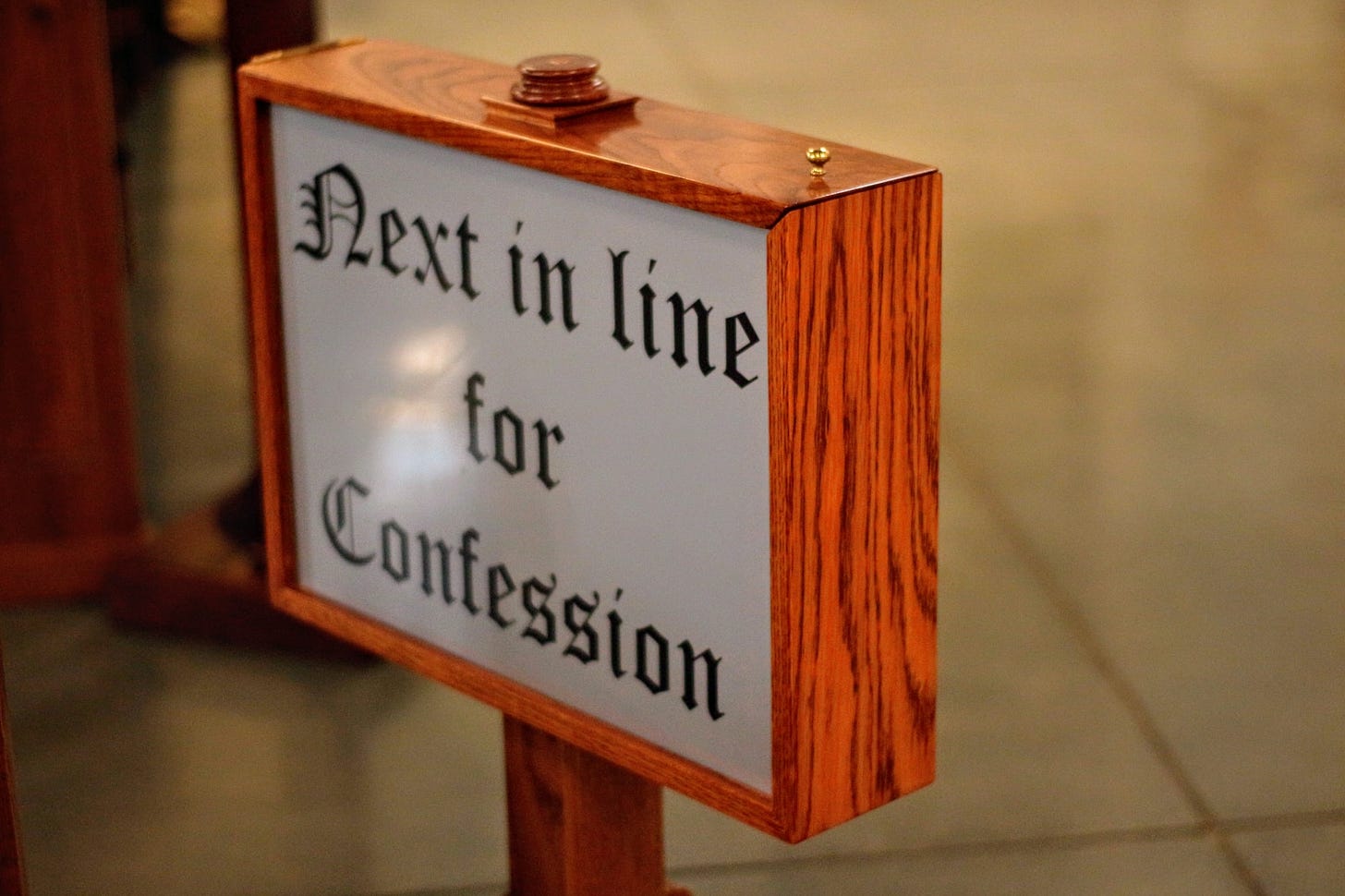
This Lent, Catholics in the United States will hear something slightly different in the confessional: the Order of Penance is changing, just a little.
What’s actually changing? Do you need to say something different? What happens if the priest forgets to say the new words?
Penitent minds want to know.
The Pillar take a look at the changes – and at the essential matter and form of the sacrament, so you don’t have to wonder “was that valid?”
— So what’s changing?
The U.S. bishops’ conference voted in June 2021 to amend the Order of Penance in two ways. Those changes were then approved by the Dicastery for Divine Worship and the Discipline of the Sacraments last year, and will enter into force on Ash Wednesday — Feb. 22.
The first change is the more obvious one.
The translation of the prayer of absolution, said by the priest, has changed slightly.
The prayer, familiar to Catholics, now says this:
“God, the Father of mercies,
through the death and resurrection of his Son
has reconciled the world to himself
and sent the Holy Spirit among us for the forgiveness of sins;
through the ministry of the Church
may God give you pardon and peace.
And I absolve you from your sins
in the Name of the Father, and of the Son, and of the Holy Spirit.”
From Ash Wednesday, the new formula will read like this:
“God, the Father of mercies,
through the death and resurrection of his Son
has reconciled the world to himself
and poured out the Holy Spirit for the forgiveness of sins;
through the ministry of the Church
may God grant you pardon and peace.
And I absolve you from your sins
in the Name of the Father, and of the Son, and of the Holy Spirit.”
As a special treat, the Vatican also approved an alternative version of the act of contrition for penitents to say while going to confession.
Most American Catholics are already familiar with the prayer, which has been customary for several decades. But beginning this Lent, it will be a formal option offered in the Order of Penance. And if you wondered, there are already 10 other options given, and even the Vatican has trouble keeping track of all of them.
O my God,
I am heartily sorry for having offended you,
and I detest all my sins because of your just punishments,
but most of all because they offend you, my God,
who are all good and deserving of all my love.
I firmly resolve, with the help of your grace,
to sin no more
and to avoid the near occasions of sin.
Amen.
📰
The second change Catholics might not notice, ever.
The Order of Penance includes Scripture readings that can be used in communal penance services, in which public liturgical prayer precedes individual confessions and absolutions.
The ritual text includes a number of Biblical readings that can be used during penance services, including several long texts of entire psalms.
The bishops voted to allow priests to use “a selection of stanzas which form a coherent whole” during penance services, instead of using an entire psalm. So if you go to a penance service, and you listen very closely, there is a chance, at least, that you might hear parts of a psalm, instead of a whole thing.
As it happens, the same “stanza selection” will be available to used during individual confessions as well.
Most Catholics don’t know that the rite of penance calls for an optional reading of Scripture during individual confessions, before penitents begin confessing their sins.
Most confessors, owing perhaps to lines outside the confessional, omit the reading – which is probably why most Catholics don't even know it's an option.
If confessors do want to read Scripture, the ritual text allows confessors to choose from several options – or, indeed, to use any reading from Scripture.
But the text explicitly allows confessors to use the readings suitable for a communal penance service – that means your confessor could read to you “a selection of stanzas” when you enter the confessional this Lent.
So be ready for it.
Ok, but what if the priest says the wrong words?
The new options for the liturgy, and the new words for the prayer of absolution, take effect from Ash Wednesday of this year, Feb. 22.
But the Church knows that old habits die hard, so this Lent is a kind of “breaking in” period where both the old and the new versions of the words of absolution are licit options for confessors.
The new version becomes the only form on Divine Mercy Sunday — April 16 — a year after the changes were approved by Rome.
But even after that, if the priest says the old version of the prayer of absolution it is still absolutely valid — the penitent’s sins are still forgiven.
All sacraments have important prayers attached to them, and the translations of those prayers are an issue of frequent discussion in the Church.
The liturgies in which the sacraments are celebrated are also (as everyone knows) subject to change and reform over time — sometimes there are small changes, and sometimes they can be dramatic.
But at the heart of all the sacraments are the essential elements — the matter and form, which are the absolute minimum necessary for the sacrament to be valid.
Believe it or not, for confession and absolution, it’s pretty straightforward.
Start your day with Starting Seven - a daily news roundup in your inbox.
What’s the ‘matter’ with confession?
The Code of Canon Law has 38 separate canons treating the sacrament of penance, and it defines the sacrament this way:
“In the sacrament of penance the faithful who confess their sins to a legitimate minister, are sorry for them, and intend to reform themselves, obtain from God through the absolution imparted by the same minister forgiveness for the sins they have committed after baptism and, at the same, time are reconciled with the Church which they have wounded by sinning.”
The essential matter of the sacrament is two people: a member of “the faithful” and a “legitimate minister.”
There are special provisions about confession for non-Catholics in emergencies or other special circumstances, but for the purposes of this explainer, let’s keep things in-house: A “member of the faithful” means a baptized Catholic and canon law provides that “a priest alone is the minister of the sacrament of penance.”
That's what you need: A Catholic and a priest.
Sort of.
Actually, it isn’t usually enough, by the way, that the priest is just ordained.
To absolve sins validly - except in danger of death -the priest also needs a faculty to hear confessions and absolve sins — which he gets either by the law itself (because the faculty comes with an office to which the priest is assigned) or by competent authority (usually the diocesan bishop).
This isn’t true of all the sacraments — a priest doesn’t need any special faculty to be able to validly say Mass, for example. But barring some exceptional circumstances, a faculty is needed for a priest to validly absolve sins.
The Council of Trent taught that “the acts of the penitent himself, namely, contrition, confession and satisfaction, constitute the matter of this sacrament,” while “the form of the sacrament of penance, in which its efficacy chiefly consists, are those words of the minister: I absolve thee, etc.”
The Catechism speaks of “two equally essential elements: on the one hand, the acts of the man who undergoes conversion through the action of the Holy Spirit: namely, contrition, confession, and satisfaction; on the other, God's action through the intervention of the Church. the Church, who through the bishop and his priests forgives sins in the name of Jesus Christ.”
Good form
If the matter is what you need physically to celebrate a valid sacrament, the “form” is what you do with that matter.
Apart from some very special circumstances when a priest can impart general absolution to a group of people (and this is only for extreme cases), the ordinary acceptable form of the sacrament of penance is “individual and integral confession and absolution” — meaning that the priest hears the confession of one person at a time, and then absolves that person.
Canon law specifies a number of things related to form which are important, but which aren’t required for validity.
For example, the proper place to hear confessions is in a church or oratory, and confessionals with fixed grilles between the priest and penitent should always be on offer for those who want to use them.
But the absolute essentials for confession and absolution are that the member of the faithful has to “confess their sins,” be “sorry for them,” “intend to reform themselves,” and then, to “obtain from God through the absolution imparted by the same minister forgiveness for the sins they have committed.”
Confessing your sins, one hopes, is self-explanatory, but the priest is also meant to help, if needed, by asking questions “with prudence and discretion” to help him understand the “quality and number” of the sins being confessed.
Penitents also need to show remorse and that they intend to reform themselves — that's why penitents are asked to make an act of contrition.
All you need to do for a good act of contrition is to state clearly that you are sorry and you do intend to reform — while there are a lot of suggested acts of contrition, no particular formula is required for a valid confession. This is why the confession of the penitent, act of contrition, and promise to reform can be thought of as quasi, intangible matter, rather than a question of form.
For the priest, though, granting absolution does require saying certain words — and those words are part of the prayer which just got a new translation.
As it happens, though, the part of the prayer which has to be said by the priest for validity hasn’t changed.
The part the priest has to say for the absolution to be valid is this: “I ABSOLVE YOU FROM YOUR SINS, IN THE NAME OF THE FATHER, AND OF THE SON, AND OF THE HOLY SPIRIT.”
That’s it.
And those words are the same in both versions of the prayer.
Yes, after Divine Mercy Sunday only the new translation of the full prayer will be licit. But if you’re in confession and the priest accidentally says the old version, it doesn’t mean your absolution is invalid.
In fact, even if the priest just says “I absolve you from your sins” and invokes the Trinity, it’s still valid. It would be bad form, sure, but it would be a sacramental form.
And your sins would still be forgiven.
📰
What a penance
The priest is supposed to impose “salutary and suitable penances,” depending on the sins which have been confessed.
But while the penitent is obliged to fulfill the penance, absolution isn’t ever granted conditionally, and it doesn’t only kick in once you’ve done your penance — when the priest says you’re forgiven, you’re forgiven.
So, if you forget to do your penance, all the sins you confessed are still forgiven. Even if you just choose not to do your penance, your sins are still forgiven – but, depending on the circumstances, you might need to confess skipping out on the penance.
Ok, now that things are all clear, you can go in peace – and get yourself to confession.
Editor's note: We made some updates to this explainer this morning in the section on matter and form after hearing from some systematic theologians. As always, thanks to our learned readers for making our coverage as smart as possible.



